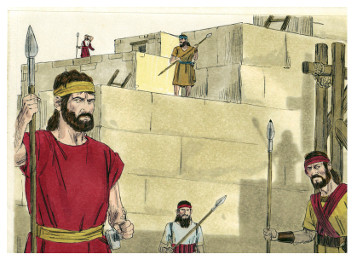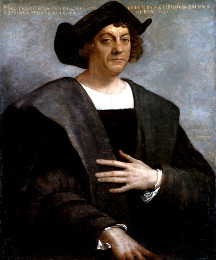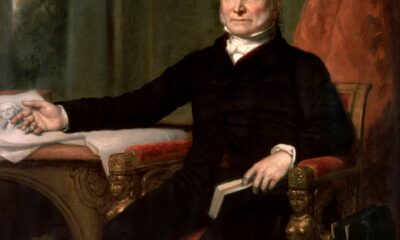Ignite the Pulpit
Light and the Glory: Nehemiah, Columbus

In the introduction to this study, I asked that everyone read Nehemiah chapters 1 through 6. Since this lesson will contain a brief discussion of the Nehemiah reading and the first chapter of The Light and the Glory, it will be a little longer than usual. If you haven’t read the first chapter of The Light and the Glory, please do so now. (Get it [amazon_link id=”B004478FSY” target=”_blank” container=”” container_class=”” ]here[/amazon_link] for the Kindle.) Next week we will be studying the second chapter.
Nehemiah – Points for Consideration:
Nehemiah lived in the “post-exilic period,” a time in history after the Babylonians destroyed Jerusalem and took many Israelites into captivity for a period of 70 years. During that time, people had lost much of their history and passion for the nation of Israel. When they returned, their beloved city, Jerusalem, was in ruins and their enemies often exploited them, ridiculed them, and intimidated them as they tried to rebuild.
Nehemiah’s name means “God is consolation.” At a time when our nation is in distress and the very foundations of our government are crumbling under foot, it would be wise to remember that God is consolation for us today as He was back in Nehemiah’s day.
Nehemiah understood that building the wall surrounding Jerusalem would take cooperation from every level of society. He also understood that is was just as important to rebuild the Law of God in their hearts, which was the spiritual foundation of the city – more so than brick or mortar. In America today, the brick and mortar may not be in jeopardy but the foundation that her soul rests upon has been shaken. And to be sure, there are those who try to exploit us, ridicule us, and intimidate us as we try to restore America from her foundation up – just as there were during Nehemiah’s time.
Many in the patriot movement have expressed concern that although we are losing our country, the general population just doesn’t seem to care. I believe that this is because we have forgotten who we are as a people and as a nation. Many don’t value America because they don’t understand who she is in the eyes of God. Hence, this study, which is being done to bring us back to our national roots and help us do our own wall building.
Study Structure
I will be covering (God willing) a chapter a week. The study format will consist of notes regarding the chapter and points for consideration. There will also be questions that are designed to make you think through the obvious and in some cases, apply the lessons being learned to your own life. You will be able to participate and comment by logging in at the end of the lesson and leave comments as you normally would for any post.
Lesson One: Moses and Columbus
Columbus believed he was called to serve Christ and carry His Light to heathen lands.
This was a man of supreme triumphs as well as supreme despair and bitterness. He also had a great ego and a great appetite for fame, fortune and power as are evidenced in his demands made to King Ferdinand and Queen Isabella.
Points to Consider
Moses was a man who had great power, fame and fortune but not a great ego. He gave up everything, first for the sake of justice and later to serve God. Moses began life as a king and chose to live as a shepherd. On the other hand, Columbus started life in humble surroundings and lusted after wealth and fame. While Columbus had a passion to serve God, his passion for power and riches often got in his way. Both men were called by God. Both started differently, both lived differently, and both ended differently.
Columbus found confirmation that he was called by God in everything around him – including his name (which meant “Christ bearer”). Conversely, Moses had to be convinced he was called by God and did not believe he was God’s Deliverer. We will not compare how both men ended until we conclude the section dealing with Columbus.
Columbus believed that Isa.49:1-6 was written for him and about him and he did all he could to convince others of his calling. In Columbus’ Book of Prophecies, he wrote:
For the execution of the journey to the Indies I did not make use of intelligence, mathematics or maps. It is simply the fulfillment of what Isaiah had prophesied. All this is what I desire to write down for you in this book.
No one should ever fear to undertake any task in the name of our Savior, if it is just and if the intention is purely for His holy service. The working out of all things has been assigned to each person by our Lord, but if all happens according to His sovereign will even though He gives advice.
QUESTIONS
- While the journal entries above seem almost humble, did Columbus begin his journey humbly?
- Moses had to be convinced of his mission, Columbus had to convince others of his mission. Do you think Columbus’ ambition was an asset in light of his situation? Consider why or why not.
- What do you think was Columbus’ real original motivation for this expedition and do you think this was his only motivation? If not, which motivating force do you think was stronger in his life and why? Do you think that his personality traits complimented or undermined each other?
- Read Isa. 49:1-6. Do you think God was calling Columbus through these verses? If so, why, and who would that make us? The latter part of this question is important if you study prophecy because if you answer in the affirmative, it gives a clue to who America might be in “the end times.” Remember that prophecies can often have more than one fulfillment. It is more than reasonable to attribute these verses to Christ. But can they also be attributed to Columbus and the mission he believed he was called to fulfill?
- If Columbus was called by God to discover the western world, do you think God had a purpose for America?
NOTE: Neither Moses nor Columbus lived a perfect life. Moses murdered a man and struck the Rock in the desert (contrary to God’s instructions, which was the reason he was not allowed to enter the Promised Land). And as we shall see as we progress through the study, Columbus’ pride and ego proved to be his downfall many times. In spite of his accomplishments, in the end he lost the respect of his contemporaries. The humanity of these men should not diminish the success of their missions but serve only as a reminder that God uses imperfect men and women to accomplish His will.
QUESTION: The biblical accounts of many of God’s men and women portray them as human beings with shortcomings just as ours. Now-a-days, we have a tendency to look for heroes that often disappoint when they fall short of our expectations. Is it healthy to look for heroes or do you think we need heroes in life? Think this through. The answer may be complex.
QUESTION: What do you think was Columbus’ worst personality trait and how did it exhibit itself?
QUESTION: Do you think Columbus’ shortcomings delayed his mission, or do you think the timing of his mission was ordained by God? Why?
QUESTION: Contrast Moses and Columbus with today’s politicians. Who most resembles Moses, and why; and who most resembles Columbus and why?
Columbus spent his youth working in his family’s wool shop in Genoa. He went to sea at every opportunity and later worked with his brother, Bartolomeo, in Lisbon as a mapmaker. This profession allowed him to travel extensively and develop navigational skills. It also afforded him the opportunity to study the maps of Marco Polo and the global projections of Eratosthenes, the Greek geographer.
QUESTION: Derek Prince once said: “The provision is in the promise.” Columbus spent many futile years trying to fulfill God’s promise – much like Sarah in Genesis. Do you think there was a reason why God made him wait so many years and spend so much energy trying to accomplish this goal on his own? If so, explain.
Columbus’ notes contained a letter he wrote to the Sovereigns. It read: “I prayed to the most merciful Lord concerning my desire, and He gave me the spirit and the intelligence for it. He gave me abundant skill in the mariner’s arts, an adequate understanding of the stars, and of geometry and arithmetic.”…”Who can doubt that this fire was not merely mine, but also of the Holy Spirit, who encouraged me with a radiance of marvelous illumination from His sacred Holy Scriptures!”
QUESTION: Referring again to Derek Prince’s statement above, do you believe God led Columbus through a process that prepared him for his calling or do you think Columbus was delusional, driven by pride and ambition? I encourage you to look at your own life and any time God may have called you to a mission. How did God prepare you for such a mission? And was it arrogant of you to think God would call you for anything – regardless of how small or large a task?
QUESTION: If a close friend told you that they believed God called them to do something vs. a television and famous evangelist says the same thing, would you feel differently in each case and if so, why?
God did not allow Columbus to persuade Ferdinand and Isabella on his own. He used Father Juan Perez, The Abbot of La Rabida, and Father Antonio de la Marchena, Vica Provencial of Queen Isabella’s home province of Castile and also Queen Isabella’s confessor who persuaded her to receive Columbus and hear what he had to say. But both men did not support Columbus’ cause until they were assured that God’s hand rested on him. Afterward, they sent a message to the King and Queen, begging them to reconsider Columbus’ proposal. This came at a time when the Royals just defeated the Moors and they were anxious to show God their gratitude. Of course Columbus almost blew it again with his arrogant demands. And once again, Columbus needed someone to intervene on his behalf. This time the Royal treasurer, Luis de Santangel, rose to his defense. He was effective and the Queen offered her jewelry as collateral to help finance the expedition, which was not needed.
QUESTION: Once again we see Columbus getting in his own way, and once again we see God raising up someone to help him out – even though many of us would say he didn’t deserve it. How many times have you ever prayed to God to get you out of a mess that you got yourself into, and how many times has God sent someone along to help you out?
QUESTION: If we pray for mercy and not justice for ourselves, shouldn’t we be willing to freely extend mercy instead of justice to others? Can you think of someone or something that has led you to pray for justice for or from them? Considering your own sin, do you think that perhaps you should pray instead for an attitude adjustment for yourself from God?
Columbus’ mission was finally approved and Columbus worked out the cost for three fast and light ships called “caravels” and the provisions for a year and wages for the 90 men that would be required to sail the caravels. The total came to two million maravedis (around 1.3 million in 2009 dollars) – a breathtaking amount even for a king. Obviously Columbus didn’t have that kind of money or those resources, but God – through His servants – supplied the provision for the promise.
Once at sea, Columbus’ strained relationship with the Pinzon Brothers came to a head 31 days after they passed the Canary Islands. The Pinzon Brothers were greatly and justifiably concerned about mutiny. The men were growing impatient and feared the new seas they were crossing. The farther they traveled, the greater their fears grew. Columbus tried to minimize the distance they were traveling to soften their fears. However, their pilots and masters knew that Columbus was deliberately shortening the daily estimates passed from the flagship. Columbus was not above fudging the records to stay the course. Once again, his human side triumphed over integrity.
QUESTION: It is easy for us to look back on Columbus and criticize how he compromised himself and his values, but if you are honest with yourself, you will find that there are many times within your life that you have done the same. Have you ever lied to anyone about anything, regardless of how you might have justified that lie? Have you ever compromised what you believed was right in order to accomplish some goal? Every day many compromise their beliefs about what is right and wrong for fear of being ridiculed by the politically correct police. If you believe Columbus was wrong to do this, then perhaps you should reconsider the compromises you may be making in your own life.
QUESTION: We see this mentality in our elected officials today. I call it the “play-along-to-get-along” mentality. It compromises to attain a goal and if you challenge them, they will tell you that you don’t know what it’s like to work in government. Compromise can take many forms. Churches also compromise for the sake of unity and for the sake of surrendering to the politically correct police. There may be times when compromise is wise, and there may be times when we are just lying to ourselves believing it is right.
Think about the differences and the degrees of compromise. Do you think it is right for our elected officials to compromise and do you think it is wise for our churches to compromise?
In the two instances above, have the compromises of our elected officials and our churches been wise and have these compromises achieved a greater good?
MOST IMPORTANT QUESTION: Because Columbus may have been called by God to accomplish this mission, it doesn’t mean that he was some kind of super hero or more righteous than any of us. Truthfully, if any of us could attain complete righteousness on our own, would we need a Savior?
Although Columbus was being pressured to turn back, he knew that if he did, that would be the end of all his dreams and he would become the laughingstock of all of Europe – and he would have failed God in accomplishing his mission. It was a lot to lose for the sake of telling the truth.
ANOTHER IMPORTANT QUESTION: How many of Columbus’ good traits do you see in yourself, and how many of his all-too-human traits do you see in yourself? And yet, God used Columbus as He uses many of us. What does that tell you about God?
QUESTION: Our Founding Fathers are often worshipped or criticized. Do you think either position is justified? If not, why; and if so, why?
Reminder: Lesson Two will be based on Chapter Two. If you have the time, I suggest you read Chapter Two ahead of time.
I hope you enjoyed this study and I am looking forward to you sharing your insights with the rest of us.
[subscribe2]
RoseAnn Salanitri is a published author and Acquisition Editor for the New Jersey Family Policy Council. She is a community activist who has founded the Sussex County Tea Party in her home state and launched a recall movement against Senator Robert Menendez. RoseAnn is also the founder of Veritas Christian Academy, as well as co-founder of Creation Science Alive, and a national creation science speaker.
-

 Civilization3 days ago
Civilization3 days agoWhy Europe Shouldn’t Be Upset at Trump’s Venezuelan Actions
-

 Accountability5 days ago
Accountability5 days agoWaste of the Day: Principal Bought Lobster with School Funds
-

 Executive4 days ago
Executive4 days agoHow Relaxed COVID-Era Rules Fueled Minnesota’s Biggest Scam
-

 Constitution5 days ago
Constitution5 days agoTrump, Canada, and the Constitutional Problem Beneath the Bridge
-

 Christianity Today3 days ago
Christianity Today3 days agoSurprising Revival: Gen Z Men & Highly Educated Lead Return to Religion
-

 Civilization4 days ago
Civilization4 days agoThe End of Purple States and Competitive Districts
-

 Executive3 days ago
Executive3 days agoWaste of the Day: Can You Hear Me Now?
-

 Executive4 days ago
Executive4 days agoWaste of the Day: States Spent Welfare in “Crazy Ways”














